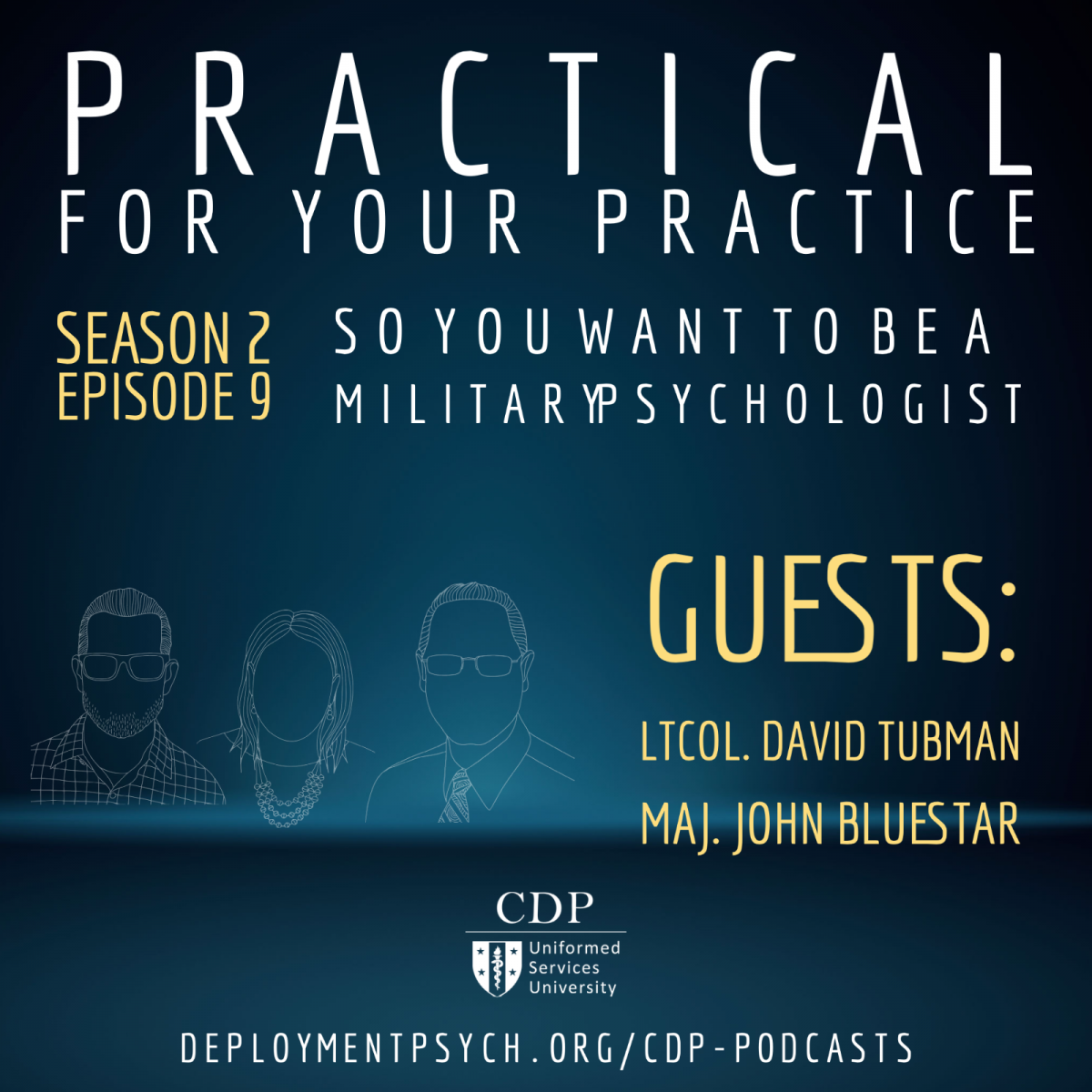 Episode 9, Season 2: "So You Want to be a Military Psychologist"
Episode 9, Season 2: "So You Want to be a Military Psychologist"
Guests: Lt. Col. David Tubman & Maj. John Blue Star
Two active duty psychologists sit down on a podcast and try to set the record straight about some of the ins and outs about becoming and serving as a military mental health provider.
What does it take to serve simultaneously as a mental health provider AND an officer? What opportunities exist in areas such as leadership, prevention (individual and systemic), as a clinician, and for training? How might YOU collaborate or consult with a military mental health provider?
Listen as popular myths are busted and unique opportunities are discussed!
 |
 |
 |
Show Notes:
Lt. Col. David Tubman is an active duty US Air Force clinical health psychologist, currently serving as the Clinical Psychology Internship Training Director at Wright-Patterson AFB, Ohio. He earned his Psy.D. at Wheaton College, Illinois, and completed both his internship and post-doctoral fellowship in clinical health psychology at Wilford Hall Medical Center, Lackland AFB, TX. Since joining the USAF in 2010, he has served in a wide range of leadership roles, to include Flight Commander, substance abuse and Mental Health Element Leader, and Director of Psychological Health. Lt. Col. Tubman has dedicated his career toward training in psychology and provided such for healthcare providers across the globe, to include the US, Germany, Canada, Africa, The Republic of Georgia, and Japan. Lt. Col. Tubman is a member of the Motivational Interviewing Network of Trainers (MINT), and is a very involved member of the Association of Contextual Behavioral Sciences (ACBS), including being the founder and past president of the ACT for Military ACBS Special Interest Group. He is passionate about delivering evidence-based population health interventions, developing effective and engaging clinical training experiences, the science of behavior change, and Acceptance and Commitment Therapy (ACT).
Maj .John A. Blue Star is an active duty US Air Force, board certified clinical health psychologist. He is the Mental Health Flight Commander at Hanscom Air Force Base. His duties include conducting biopsychosocial evaluations for active duty and their families and retirees with health conditions, coordinating community-level population health program initiatives, providing behavioral treatment to individuals and groups with focus on quality of life improvement, and supervising clinical activities and conducting didactics for psychology interns. Maj Blue Star has specialty focus in implementing interdisciplinary care for Active Duty service members with chronic pain and associated functional impairments, with emphasis on improving military readiness and decreasing risks involving opioid medication. Maj. Blue Star serves as the President Elect for the Association of Contextual Behavioral Sciences ACT for Military SIG and has been accepted as a member of the Motivational Interviewing Network of Trainers (MINT). Maj Blue Star completed his doctorate in Clinical Psychology in 2015 from Brigham Young University in Provo, Utah. He joined the Air Force as a Health Professions Scholarship Program recipient in 2012 and commissioned in July 2014. Prior to his current position, he served as the ADAPT Program Manager, Suicide Prevention Program Manager, and Disaster Mental Health Team Chief at MacDill AFB in Tampa, Florida.
Resources mentioned in this episode:
- ACT for Military Special Interest Group [34:00]
- Society of Air Force Psychologists [34:30]
- CDP’s Military Culture course [35:40]
Calls-to-action:
Subscribe to the Practical for Your Practice Podcast
Subscribe to The Center for Deployment Psychology Monthly Email
This podcast is produced by the Center for Deployment Psychology at the Uniformed Services University of the Health Sciences. The views expressed are those of the speakers and do not necessarily reflect the opinions of the Uniformed Services University, the Department of Defense, or the US Government. In addition, reference to any specific company, products, processes, or services does not necessarily constitute or imply endorsement by the Uniformed Services University, the Department of Defense, or the US Government.
